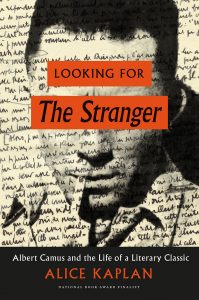Alice Kaplan on the origins of “Meursault”

Meursault, the protagonist (or anti-hero) of Albert Camus’s The Stranger, is one of literature’s all-time classic characters—a French-Algerian, emotionally detached drifter who murders an Arab in a griefless rage. Below, Alice Kaplan, author of the National Book Critics Circle-nominated Looking for The Stranger: Albert Camus and the Life of a Literary Classic, writes at Wonders and Marvels on the origins of the character’s name, and her theory as to why Camus picked the epithet he did.
***
For any French reader, that name can only signify the delicious and expensive white Burgundy wine.
I was really shocked when I looked at the only surviving manuscript of The Stranger and discovered that Camus writes his character’s name without a “u” throughout. Where did that “u” come from? Some Camus experts claim he thought of the name change at a dinner party where he was served an especially good bottle of the Burgundy wine. Then there’s the story of the contest. Every November, a literary prize of 3,000 bottles of Meursault wine was awarded to a book celebrating the glory of the land. An ad for the prize appeared in the French press in November, 1941, as Camus was putting finishing touches on his novel. Although Meursault isn’t a very funny guy, Camus himself had a great sense of humor, and I can imagine him joking to his friends that naming his main character “Meursault” was a sure way to win the prize.
Certainly Camus had other reasons to make the change. First there is something more expected about the way Meur-sault sounds to a French ear than Mer-sault. Then again, the extra “u” makes the first syllable of his character’s name signify death meur (death), which serves the purposes of a story in which Meursault commits murder and waits to die at the guillotine.
I have another theory about the name change, but no way to prove it. In the early spring of 1942, Camus was in Oran, Algeria, deathly sick with tuberculosis. So he asked his publishers to proof read the pages of the novel for him, in Paris. Is it possible that they took matters into their own hands, or that they checked with the author in a communication that is lost to us, and changed Mersault to Meursault on publisher’s page proofs? Some of the greatest moments in world literature are the result of a last minute, last second cross out. We’ll never know if this is one of them.
***
To read more about Looking for The Stranger, click here.